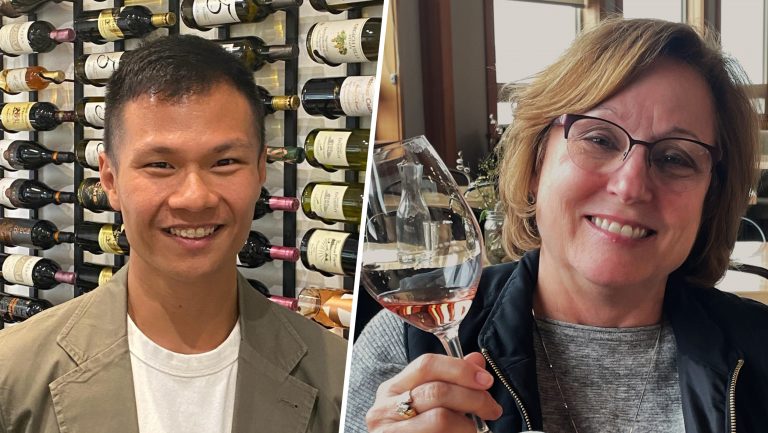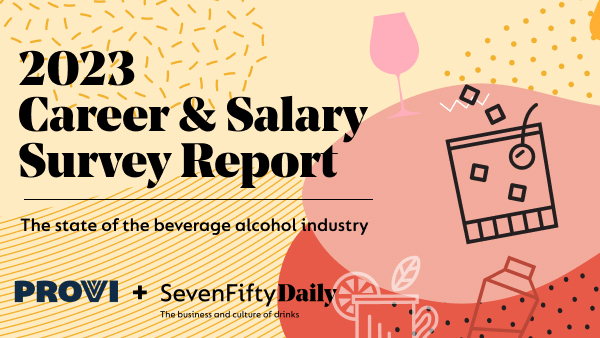The journey to becoming a wholesale wine and spirits sales rep is common among those who have worked in retail and restaurants. For some folks, particularly those seeking better work-life balance or reconsidering their long-term career prospects, leaving their roles at wine shops and dining establishments for the world of distribution can feel like a natural progression. But the transition can come with challenges, even for those familiar with buying and selling beverage alcohol.
Each tier intertwines within the greater wine and spirits industry. And yet, the job function of a wholesale rep is still entirely different from that of on- and off-premise sales. Undoubtedly, having previous experience in retail or restaurants gives a potential sales rep an edge. However, past experience doesn’t necessarily guarantee success in the job.
“One thing people need to know is that being a good salesperson is pretty important if you’re going to work in distribution,” says Asher Chong, a former Jean-Georges sommelier who now works as a New York City metro sales representative at Wilson Daniels. “And you don’t have to come from restaurants or retail to have that fundamental skill.”

Don’t miss the latest drinks industry news and insights. Sign up for our award-winning newsletters and get insider intel, resources, and trends delivered to your inbox every week.
So, what do you need to know before switching from being a buyer to a sales rep? There’s a lot to consider, starting with understanding the primary function of the job you’re looking to take on. “The sales rep’s role is first to maintain current business in your assigned accounts,” says Karen Wetzel, a wine consultant and industry career coach, as well as the former director of midwest on-premise sales for Constellation Brands. “You have to be able to work with those buyers, protect the business that the distributor is handing over to you.” Second, a sales rep must grow the business in their accounts and find new business. That can happen in various ways, but more often than not, a sales rep is going at it alone.
Be Comfortable Working Alone—and on the Go
Although sales reps work for a company and are usually placed on a specific team, they typically manage their accounts alone. The rep’s job is to get their products in front of buyers and to seal the deal with placements on menus and store shelves. How that gets done, to some degree, is up to the rep.
“It’s not a great role for people who need a lot of supervision,” says Wetzel. “Occasionally, a manager may want to go out with you to see what you’re doing and give you advice and training. But wholesale is really a role for self-motivated people because you’ll be doing most of the job independently.”
“And be prepared to live in your car,” adds Wetzel. Unlike restaurants and retail shops, where employees spend most of their time in one place for the entirety of their shift, working as a sales rep requires a willingness to travel. Technology and email have brought a significant change to how reps interact with their buyers. Nowadays, people can place an order without even speaking to sales reps. But at some point, Wetzel says, you have to get out of the office and go to where the buyers are. “If you’re not getting face time with your buyer, guess what? Your competition is,” she says.

A year ago, when John Shirk transitioned to sales at Jenny & Francois Selections after working in restaurants for more than 12 years, he realized that many reps weren’t going out in the field and meeting with clients on certain days of the week. So he made sure he was out on those days to get a head start.
“I’ve found going out when everybody else is in the office doing admin stuff very beneficial,” says Shirk. His restaurant experience helped him understand that buyers rarely work traditional hours. With that in mind, he leaves the emailing and scheduling to when he knows buyers are actually on their computers.
Communication Is Key
At a restaurant, it’s all about catering to guests in the dining room. At a retail store, the focus is servicing the customer and helping them pick the right bottle. For wholesale, the exchange occurs between a rep and a buyer, which means the communication style may have to change.
“Now, the buyer is the customer,” says Charlotte Randolph, a sales representative for Revel Wine in San Diego. “So the way you talk about wine becomes very different from what it was in your day-to-day life at a restaurant or retail shop. You have to be more technical.”
Wetzel says there is no one-type-fits-all personality for being a sales rep—your ability to communicate the product and build relationships with the people you’re selling to is what matters. “You’re going to be juggling many different accounts. You have to know what you’re presenting and who you’re presenting it to.” A key part of this challenge is knowing the new restaurants and shops opening in your area, staying up to date on news within the industry, going to tastings and events, and networking with others in the field.
Keeping an open mind and being flexible goes a long way toward maintaining solid relationships with buyers, too, says Chong. “It’s a new generation of buyers out there, and they operate entirely differently than some who have been in the industry for a long time. It even comes down to how you dress for an appointment,” he says.
While Chong will go as far as wearing a “double-breasted suit with a tie” to appointments at private clubs and some restaurants, he says that if he showed up like that at other places, they’d probably “laugh me right out of there. Some places just appreciate a T-shirt and jeans. And these little things really make a huge difference in how buyers interact with you. It’s all about knowing your customer.”
Higher Pay Is a Draw—But It’s Variable
One of the reasons people leave their jobs in retail or restaurants is the chance for better pay and benefits. SevenFifty Daily and Provi’s 2023 Career & Salary Survey found that the median salary for those working in import and distribution was higher than the median salaries of both on- and off-premise positions. Depending on the distributor—especially if it’s a larger company—reps have more room to negotiate salary, bonuses, and benefits.
However, while there’s a chance to make big bucks with commission-based pay, it can be unclear exactly how much money a rep will make in a given year.
“It can be hard to plan for the immediate future financially,” says Randolph. “There are no benefits for commission employees such as myself, but also, my pay range has much higher potential than it did when I was in restaurants.”
So what’s the payoff? “The work schedule,” says Randolph. “I would rather take the risks of commission-based pay and have more freedom than be tied to the unconventional hours of a restaurant.”

Schedule Flexibility Is a Bonus
Lifestyle changes are often the biggest motivation for leaving retail and restaurants behind in exchange for wholesale. Whereas the working hours for on- and off-premise positions can be long and vary from week to week, one of the biggest perks of working distribution is that reps usually create their own hours.
“I can work as hard as I can during the day, and put everything into it, and then I get to come home, make dinner, and be there for my family,” says Shirk. “My personal life was the last thing I thought about when working in restaurants because all my energy went into the job.”
Chong agrees that having personal time to himself has been a major benefit. “The first few months of working in wholesale, I felt like I had a lot of time on my hands,” he says. “I didn’t know what to do with the freedom. But then I realized that most of the working population has off-hours, weekends, and holidays where they get to sit back and relax.”
That doesn’t mean Chong is any less busy. Some days, all his time is spent responding to emails, phone calls, and text messages, visiting with customers, or meeting with the brands and producers he represents. However, the workload isn’t as strenuous, and the hours are more regulated.
“It’s been a real shift in getting to know the product,” says Shirk. “I get to meet the people that make it, the farmers. I’ve been able to go to France and meet some of the growers. I’ve met winemakers that have come here for portfolio tastings and things. All that has pushed me to love the industry even more.”

Dispatch
Sign up for our award-winning newsletter
Don’t miss the latest drinks industry news and insights—delivered to your inbox every week.
Janice Williams is a New York City-based freelance writer covering wine and spirits. Certified WSET Level II, her work has been featured in print and online publications, including Newsweek, Wine Enthusiast, VinePair, Uproxx, and Thrillist, among others. You can follow her work on Instagram @browngirldrinkswine and website janicewilliams.net.









